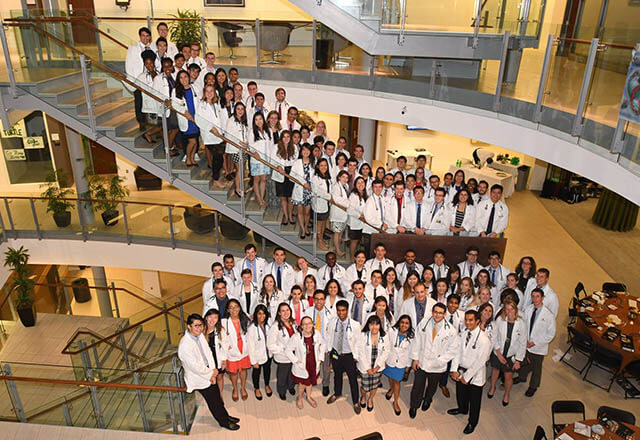Year One Overview
The first week of school consists of orientation activities and TIME: Disparities and Inequities in Health and Health Care. This one-week course provides a great introduction to the rich culture and challenges of East Baltimore and allows the students to participate in service learning with their peers. It is an excellent opportunity not only to get to know their classmates in an active setting, but also to jump start the students' involvement in the Baltimore community.
September Through December
Following TIME: Disparities and Inequities in Health and Health Care, the first four months of classes are the Foundations Block. This includes:
- Scientific Foundations of Medicine
- Clinical Foundations of Medicine
- Foundations of Human Anatomy
- Foundations in Public Health: Epidemiology, Ethics and Health Care Systems
Classes begin with seven weeks of Foundations of Human Anatomy running concurrently with Clinical Foundations of Medicine. Anatomy provides the quintessential medical school experience, while Clinical Foundations provides the students with patient contact from "day one." Once they have finished the seven weeks of anatomy, the students begin Foundations in Public Health: Epidemiology, Ethics and Health Care Systems which introduces issues in global health, health policy, injury prevention, interaction with the pharmaceutical and other industries, and bioethics and epidemiology.
January Through June
In January of Year One, the course Genes to Society begins. GTS is a systems-based course, which teaches the genetics, biology and physiology of each organ system and the impact that social, community and environmental issues have on the health and well-being of individuals. The students participate in Longitudinal Ambulatory Clerkship one half-day a week. This clerkship places them in an outpatient or community setting with a faculty preceptor. The students have direct contact with patients and are able to use what they learned in Clinical Foundations as well as develop more advanced patient care techniques.
During this time, the students also have the opportunity to choose their Scholarly Concentration. Working with faculty mentors, the students choose a topic of interest to them that they would like to explore in detail. The general topics are basic science, clinical research, history of medicine, medical humanities, and public health/community service. At the end of Year Two, a final paper on their scholarly concentration will provide the students with an opportunity to describe the work they have done.
Topics in Interdisciplinary Medicine
Every few months throughout the entire curriculum, the students have one-week "TIME" courses. The TIME courses in Year One are focused on Disparities and Inequities in Health and Health Care (mentioned above), Obesity, Nutrition & Behavior Change, Global Health, High Value Healthcare, Disaster Medicine, Clinical Informatics, and Pain Care. During these weeks, the students have the opportunity to break away from the organ‐based class work and focus on advanced clinical skills, simulation experiences and their scholarly concentration.


